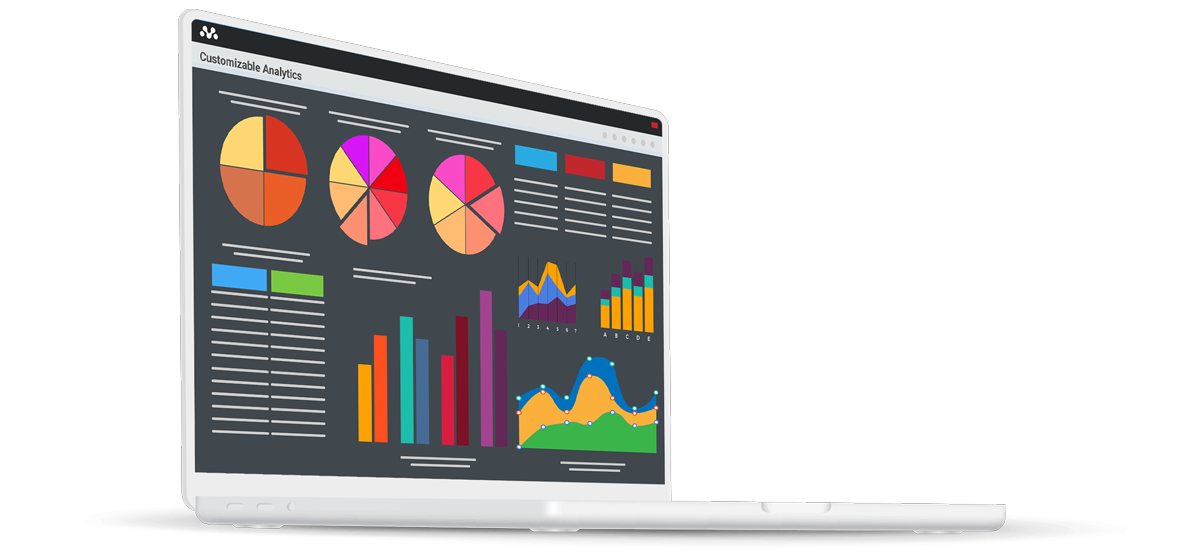Key Performance Indicators (KPIs), or dashboards as they are often referred to, are the hallmarks of any good CRM. While CRMs benefit businesses on many levels in a variety of different ways, dashboards are a critical, yet often overlooked component that many business owners and sales managers tend to neglect.
Dashboards provide insight into your organization that is nearly impossible to see without using a CRM or ERP. It helps business leaders peel back the layers of their operations in virtually all departments and review data at a depth that can help them make better decisions and navigate their business more effectively. There is one caveat: Dashboards are not magic. They report back the available information. Therefore, in order to be effective, management needs to make sure they have their users moving through their internal processes with discipline, making sure data is both accurate and complete. Your KPIs will be useless if they lack information.
Not all CRMs are capable of reporting the same data. Budget CRMs like Insightly, Zendesk Sell, and Nutshell Sell will give your general sales related information, while mid-market CRMs like Salesforce, MS Dynamics CRM and Mothernode will let you dive deeper into your business.
When it comes to reviewing data, popular go-to dashboards usually are related to forecasting and current sales activity. These should never be ignored and are most common with many responsible sales managers and business owners. We typically refer to these types of KPIs as reporting. They report the raw numbers back to users in real-time. However, when it comes to data insights, the analytics or analytical data is often ignored. Analytics can help you review deeper data that surface numbers can’t demonstrate on their own. Think of it in these terms. When you visit your doctor with a cough, you’re reporting your problem. Then you provide your doctor with the additional analytics about your condition to help better understand why you are coughing. With the right analytics, they can formulate a more precise diagnosis and prepare a palatable action plan to improve your health. The same can be accomplished by business leaders who routinely look at their KPIs.
Though we encourage management to frequently review their favorite KPIs and reports, the following are four KPI analytics we recommend to be part of any dashboard regimen. When applicable, data should be viewed on a group and individual basis to spot differences, patterns, and areas for improvement. These are listed in no particular order of importance:
Lead/Customer Source
Understanding where you have the best success with your leads or acquiring new customers is a critical component to improving your customer acquisition. Different lead sources can have varying sales cycles and types of buyers. Volume doesn’t always equal quality. Additionally, different lead sources often require different marketing content for their respective audiences. Sales managers should monitor their lead sources on a quarterly or semi-annual basis and continue to gauge their effectiveness. They should also do YOY comparisons to look for shifts and possible flags. Monitoring your lead sources will help you focus on the channels that deserve your primary focus and marketing dollars.
Selling Stage (Funnel)
Whether you use a CRM or not, every sales process has a funnel that consists of selling stages that takes your buyer from prospect to customer. Stages help define where your buyer is within your sales process. Aside from the usual analysis of how much money is sitting in your funnel by stage or how many opportunities are in each stage, sales management should also look at other factors such as how long opportunities stay in stages to determine bottleneck and potential causes. Economies, shifts in your markets or buying patterns can require you to alter your sales process. It’s not uncommon for funnels to change over time. Monitoring selling stages by the individual is also a good way to see where some of your reps may be struggling.
Market Segment
Market segments represent the different industries your business sells to. Similar to lead source, market segments help you understand where your best business comes from. This will help you build sales strategies for your more popular market segments and determine which segments are underperforming that could use more attention. Market segments often require different approaches in the sales process and their own marketing messages, in order to be successful. Imagine a company that services commercial and residential customers. Successfully selling to both industries requires more personalized approaches when interacting with either market.
Close Ratio (by Rep)
You’re CRM can help you analyze all sorts of useful data within your business and sales process. One of the most import is your sales reps ability to close deals. Some sales managers often are distracted by meaningless information, like how many emails are sent or how many phone calls are made by each rep. Simply put, if your criteria are monitoring phone calls, then you’ll get phone calls. If your criteria are revenue-based, then you get dollars. Focus on your sales rep’s ability to close deals. If you spot differences in your reps’ performance, turn to other criteria to learn why. Are there differences in the quality of leads (lead source) or are they selling to a more difficult industry (market segment)?
Like the doctor example used earlier, don’t let any single KPI depict a story on its own. It’s ok to have assumptions because those assumptions can provide a starting point for your analysis. Always watch for trends and inconsistency. Some KPI data can be built automatically, such as win/loss. Other data might require a little more discipline from your users, such as advancing selling stages or tagging market segments. Make sure your users understand why you depend on this data. Remind them routinely by reviewing it with them.

